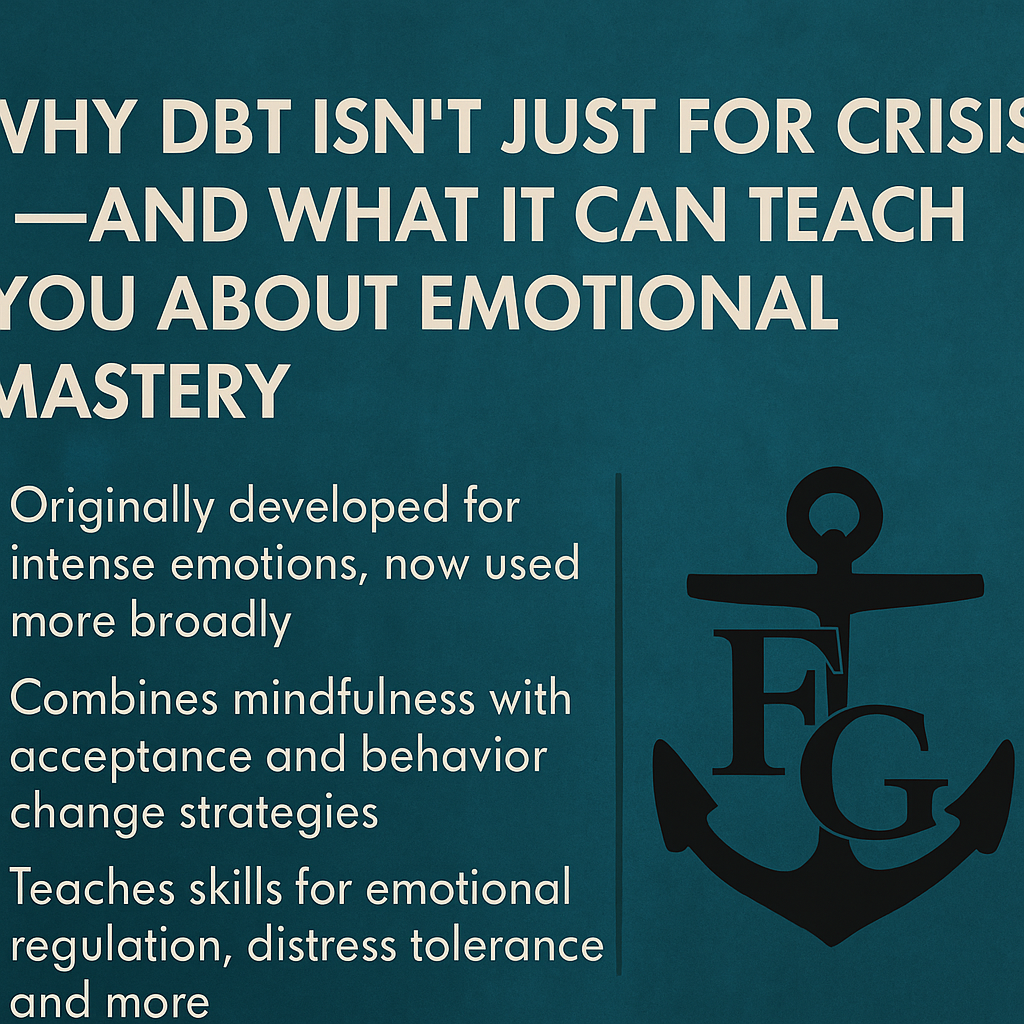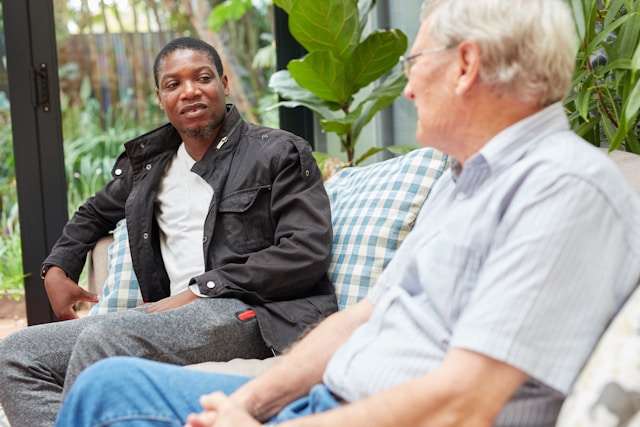It’s easy to associate DBT with crisis care. Maybe you first encountered it during a rough patch, or maybe you’ve only ever heard it mentioned in connection with borderline personality disorder. But at its core, Dialectical Behavior Therapy (DBT) is a system of emotional wisdom—and it holds value far beyond moments of emergency.
In fact, DBT may be most powerful when life feels… flat. When emotions aren’t raging, but they’re not fully alive either. When you’re no longer surviving—but not quite thriving.
What Is Dialectical Behavior Therapy, Really?
DBT is a structured, evidence-based therapy that blends mindfulness with behavior change strategies. Originally developed to help people experiencing intense emotional swings or self-harming behaviors, it’s now used more broadly to support anyone dealing with emotional dysregulation, chronic overwhelm, or disconnection from themselves.
Think of it as a life skills program with a therapeutic foundation. The “dialectical” in DBT refers to balancing two opposing ideas—acceptance and change. In DBT, you learn to accept yourself as you are and work toward becoming who you want to be.
This approach makes DBT particularly helpful for people in long-term recovery or those managing ongoing mental health challenges. It isn’t about patching up a crisis. It’s about learning to navigate life with more clarity, choice, and emotional stability.
Mindfulness: The Skill of Coming Home to Yourself
At the heart of DBT is mindfulness—the practice of being fully present in the moment. In DBT, mindfulness isn’t just about meditating or breathing techniques. It’s about becoming more aware of your thoughts, feelings, and actions without judgment.
Mindfulness helps you:
- Notice when you’re emotionally activated before you react
- Tune into your physical and emotional needs
- Develop a calm, observing self that can guide decision-making
You might start with something as simple as naming what you’re feeling: “I’m anxious right now.” Instead of getting caught up in that anxiety or trying to push it away, you acknowledge it. That small shift makes space for a more thoughtful, intentional response.
Emotional Regulation: Feeling Without Overflowing
Emotional regulation skills are the tools DBT offers to help you manage your feelings effectively. These skills are especially useful if your emotional landscape feels unpredictable or overly muted.
With emotional regulation, you learn how to:
- Identify what you’re feeling and why
- Reduce vulnerability to emotional spirals
- Build positive experiences to shift mood over time
For example, if you tend to shut down or isolate when overwhelmed, DBT might help you plan small mood-boosting actions—a walk, reaching out to a friend, or even watching something lighthearted—to interrupt that cycle and bring you back into emotional motion.
Distress Tolerance: Getting Through Without Breaking Down
When pain hits—emotional, relational, or existential—distress tolerance skills are what help you ride it out without making things worse. These tools are not about avoiding pain; they’re about surviving it safely.
Distress tolerance skills include:
- Self-soothing techniques using the five senses
- Grounding exercises to stay in the present
- Crisis survival strategies that prioritize harm reduction
For someone in long-term recovery or dealing with ongoing mental health symptoms, these skills can act as a buffer. They give you something to reach for when you’re emotionally overloaded, when talking it out isn’t an option, or when nothing feels meaningful.

Interpersonal Effectiveness: Strengthening Your Relationships
DBT also offers a powerful set of tools for communicating your needs clearly and maintaining boundaries without damaging relationships. These are known as interpersonal effectiveness skills.
You learn how to:
- Ask for what you need without aggression or guilt
- Set boundaries without withdrawing emotionally
- Navigate conflict while preserving self-respect
These tools become especially important when you’re no longer in crisis mode, but are rebuilding your sense of self in your relationships. Many people find that these skills help restore not just communication—but connection.
DBT for Emotional Flatness and Disconnection
Feeling emotionally “flat” doesn’t mean something is wrong with you. It often means you’ve been through a lot, and your nervous system has adapted by going quiet. But quiet isn’t always peace. Sometimes, it’s absence.
DBT helps you find safe ways to reconnect with your inner life. It doesn’t force intensity or pressure you to feel anything specific. It simply makes room for curiosity:
- What do I notice in my body?
- What do I actually want right now?
- What would make me feel more real today?
When those questions begin to stir something in you—even a flicker of interest—you’re already reconnecting.
“I thought DBT was for people in chaos. But it actually taught me how to be with myself in everyday life. That was the bigger win.”
— DBT Group Participant, 2023
Ready to Take the Next Step?
You don’t have to be in crisis to benefit from DBT. If you’re looking to feel more alive, more centered, and more capable of responding to life on your own terms, DBT might be exactly what you need.
📞 Call us at (888) 685-9730. We’ll talk it through—together.
Frequently Asked Questions About DBT
Is DBT only for people with borderline personality disorder?
No. While DBT was originally developed to treat borderline personality disorder, it is now widely used to support people dealing with anxiety, depression, PTSD, and emotional dysregulation—or even just emotional numbness. Anyone looking to build emotional resilience can benefit.
How is DBT different from other types of therapy?
DBT combines standard cognitive-behavioral techniques with mindfulness and acceptance-based strategies. It’s structured, skill-based, and often includes group sessions alongside individual therapy. The goal isn’t just insight—it’s practical change.
What if I don’t feel like I’m in a crisis—can I still do DBT?
Absolutely. DBT is just as effective for people looking to deepen emotional awareness, improve relationships, or reconnect with a sense of purpose as it is for those in acute distress. You don’t need to be in pain to benefit from growth.
How long does DBT take to work?
Many programs run for 6 months to a year, but even a few months of skills training can make a noticeable difference. What matters most is consistency and willingness to practice the tools in your daily life.
Can I start DBT if I’ve already done therapy before?
Yes. DBT is often a great fit for people who feel like they’ve “done therapy” but still struggle with emotional reactivity, numbness, or relationship issues. It offers a new lens and new tools.
For more information, visit our page on Dialectical Behavior Therapy in Massachusetts or call (888) 685-9730 to speak with someone today.








